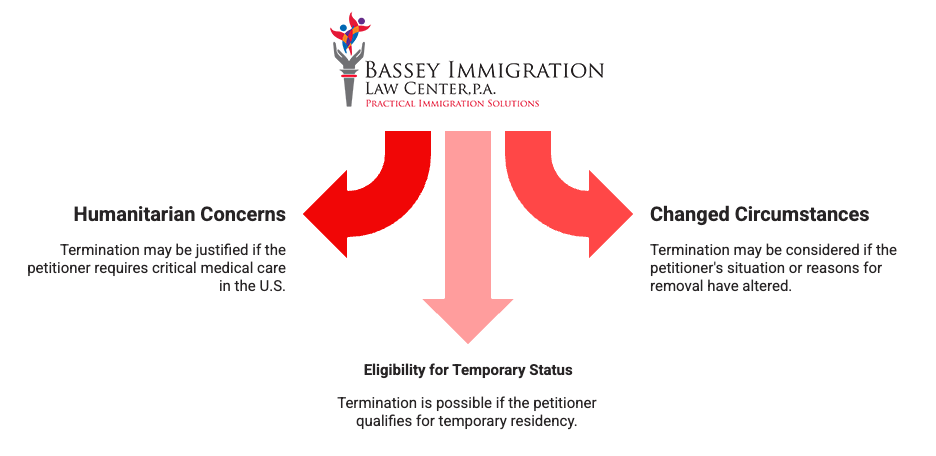What is the Difference Between Dismissed and Terminated Removal Proceedings?
U.S. immigration judges conduct removal hearings to determine if a non-U.S. citizen may remain in the United States. A removal proceeding that has been terminated can be re-opened or refiled, and termination offers only temporary relief from potential deportation. If a removal proceeding is dismissed, that dismissal is generally permanent and cannot be reopened or renewed.
If you are scheduled to appear at a removal hearing, a Florida immigration appeals attorney from the Bassey Immigration Law Center in Tampa can help you improve your chances of having the removal petition dismissed, which will better allow you to seek permanent residency in the United States.
With more than 20 years of experience in challenging removals and other adverse immigration matters, we use the full force of our knowledge and experience to benefit non-citizens who want an opportunity to pursue a life in the United States.
What might justify termination of a removal proceeding?

Either the U.S. government or a petitioner can move to terminate removal proceedings. Some of the common reasons for termination include:
- Humanitarian concerns, for example, that the petitioner is receiving critical medical care in the United States.
- The petitioner’s circumstances or the reasons for seeking removal have changed.
- The petitioner has become eligible for temporary resident status, for example, through employment or a change in family status.
The reasons for terminating removal proceedings can change, even after an immigration judge grants a motion for termination. If that happens, the government can review the case and elect to begin new removal proceedings based on a non-U.S. citizen’s new situation.
When might a removal proceeding be dismissed?
An immigration judge might dismiss the U.S. government’s removal efforts upon determining, for example, that the government did not prove the necessary facts to warrant the removal of the non-U.S. citizen or violated that person’s rights to receive fair treatment and due process.
During the past several years, immigration judges have also dismissed tens of thousands of deportation cases for lack of jurisdiction because the government failed to file the necessary “Notice to Appear” with the removal court before the hearing date.
A knowledgeable attorney for immigration appeals in FL will carefully review the details of removal proceedings for these and other shortcomings and errors to determine if dismissal is warranted. Once a removal case is dismissed with prejudice, the government cannot refile it, and as a result, the petitioner will have a much better opportunity to seek permanent U.S. residency.
What Happens After Dismissal or Termination?
When removal proceedings are dismissed or terminated, it generally means the government or the immigration judge has ended the deportation case. However, as noted, the implications of each outcome are different.
- Dismissal typically occurs at the request of the Department of Homeland Security (DHS), often when they determine that removal is no longer appropriate or the Notice to Appear (NTA) is legally defective. Usually, a dismissal is final and cannot be reopened or reinstated based on the same charges, offering a more permanent resolution. However, dismissal does not confer lawful immigration status; it simply ends the current proceedings.
- Termination, on the other hand, is a formal decision by the immigration judge to end the proceedings, often because the government failed to meet its burden of proof or because the individual is eligible for relief outside of court. Termination may leave open the possibility that DHS could refile charges or initiate new proceedings in the future if circumstances change.
In both scenarios, the removal process is halted, but neither outcome automatically grants legal status. Individuals must still pursue any available immigration benefits, such as adjustment of status, asylum, or other forms of relief, through USCIS or the appropriate legal channel.
How Does Dismissal or Termination Affect Future Immigration Applications?
While dismissal or termination of removal proceedings ends the immediate threat of deportation, it does not grant legal status. However, it can improve your chances with future immigration applications, as you’re no longer in active removal. Since a dismissal is typically final, it may help avoid complications in future filings.
A termination, however, may leave open the possibility of future proceedings, depending on the circumstances. In both cases, your immigration history—including the reason for the dismissal or termination—will be considered in any new application, so it’s vital to consult an attorney before filing.
Dismissal vs. Termination: Which One Is Better for Your Case?
Whether dismissal or termination is more beneficial depends on your specific immigration circumstances:
- Dismissal is often preferable if you are not eligible for relief in immigration court, but may qualify for a benefit through USCIS–such as adjustment of status or a visa petition. Once the case is dismissed, you are no longer in removal proceedings and typically do not need to take further action related to the court. Since dismissal is often final and cannot be refiled on the same grounds, it offers more long-term security.
- Termination may be more appropriate if you are pursuing relief within the court system, such as asylum, cancellation of removal, or withholding of removal. Termination ends the case but may leave the door open for DHS to reinitiate proceedings in the future, especially if the underlying issue is procedural or technical.
The Impact of Recent Immigration Policies on Dismissal and Termination
Under laws like SB 1718 (2023) and newly enacted legislation such as SB 2-C and SB 4-C (2025), Florida has expanded the role of local law enforcement in immigration enforcement.
As a result, individuals in Florida who might otherwise qualify for dismissal or termination of removal proceedings now face heightened scrutiny and enforcement risks, even after their proceedings end. For example:
- Local agencies may refer cases back to ICE, even after dismissal, potentially triggering the re-initiation of removal proceedings.
- Dismissals may be harder to obtain, as ICE, under more aggressive state-federal cooperation, may oppose prosecutorial discretion that would otherwise lead to dismissal.
- Terminations pursued for procedural or technical reasons may still leave individuals vulnerable under Florida’s expanded enforcement framework.
At Bassey Immigration Law Center, we understand both federal and Florida-specific immigration dynamics. We can help protect your rights, explore all available immigration options, and guide you toward a more secure future in the U.S.
Call the Bassey Immigration Law Center for Representation in Removal Proceedings
Removal proceedings can lead to deportation orders. When you are represented by a Florida immigration appeal lawyer from the Bassey Immigration Law Center, we will fight aggressively to prevent your risk of deportation and to get those proceedings dismissed to prevent immigration officers from seeking your removal again.
Please call our offices in Tampa, Florida, for a confidential conference with one of our immigration attorneys. We will provide straightforward answers to your questions and determine how your case can be managed to prevent your removal from the United States.
About Bassey Immigration Law Center, P.A.
Bassey Immigration Law Center, P.A., led by attorney Aniefiok Bassey, provides comprehensive immigration services to individuals, families, and businesses in Florida and beyond. With over 20 years of experience, the firm assists clients with a wide range of immigration matters, from family reunification and green cards to business visas and deportation defense. The diverse, multilingual team is dedicated to supporting clients through the complex immigration process, with a special focus on citizenship, asylum, and LGBTQ+ immigration needs. They offer affordable initial consultations and are committed to delivering personalized, strategic guidance for achieving clients’ immigration goals.



